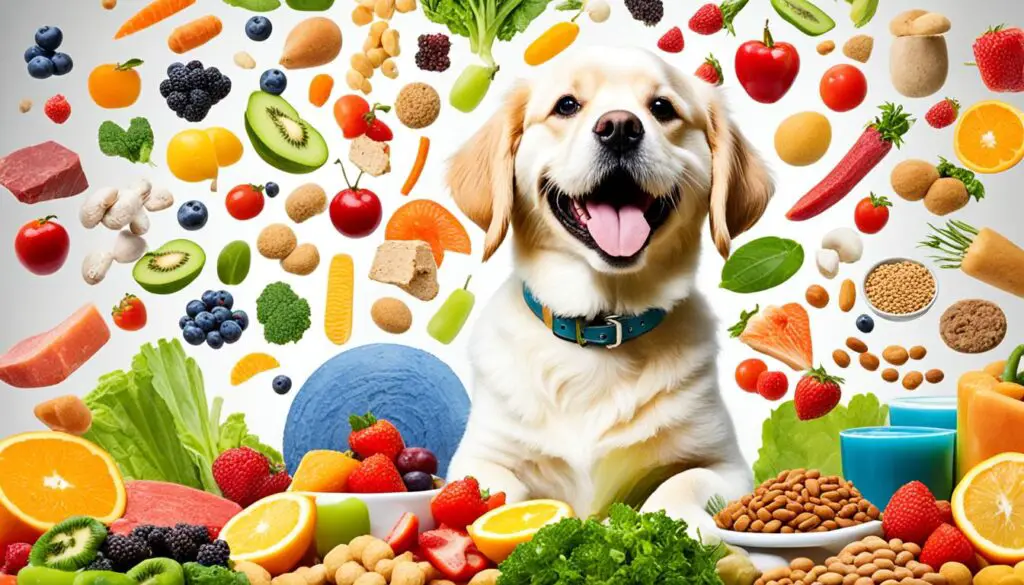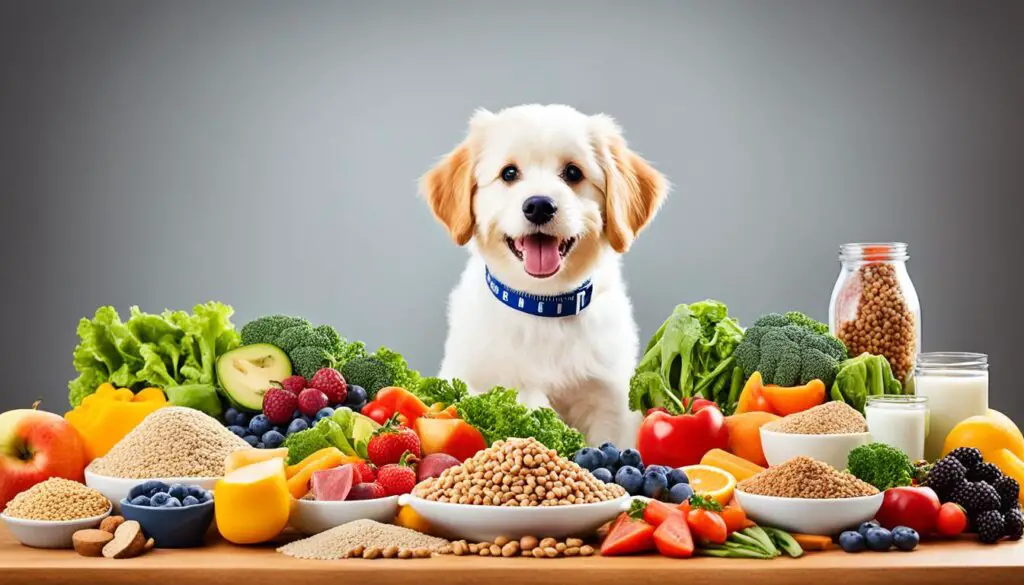We all want the best for our pets, and their health is super important. A well-balanced diet is key to keeping them happy and healthy. Pets need the right nutrients just like we do.
A good diet for your pet includes protein, carbohydrates, fats, vitamins, and minerals. Each has a special job in keeping your pet well. For example, protein helps with growth and repair. Carbs give them energy. Fats make their coat shiny, and vitamins and minerals support their health.
It’s important to pick high-quality pet food made from real food. Think about what your pet needs based on their age and size. A vet can help you figure out the best diet for them.
Keeping your pet on a balanced diet helps them stay strong and healthy. It also keeps them full of energy and prevents future health issues.
Key Takeaways:
- A well-balanced diet is crucial for your pet’s health and vitality.
- Protein, carbohydrates, fats, vitamins, and minerals are essential components of a balanced diet.
- High-quality pet food with real, whole food ingredients is important for your pet’s nutrition.
- Consider your pet’s unique needs, such as age and size, when selecting their food.
- Consulting with a veterinarian can help determine the specific nutritional requirements for your pet.
Why Your Dog Needs a Balanced Diet
Dogs are omnivores. This means they need both plant and animal foods to stay healthy. While meat is essential, their diet should also include minerals, vitamins, carbohydrates, and essential fatty acids.
Carbs like grains and veggies give dogs energy and are easy for them to digest. Complex carbohydrates become even easier to digest once cooked. This is good news for your furry friend. Remember, cooked foods are often better for dogs because they digest them well.
Feeding your dog raw foods can be risky. It’s very important to handle and prepare raw foods correctly. Doing so prevents bacterial contamination and keeps you both safe.
The Association of American Feed Control Officials (AAFCO) sets nutritional standards for commercial pet foods. Still, not all dogs are the same. Their dietary needs can vary widely depending on their breed, activity level, and health.
Talking to a vet is key to understanding what your dog specifically needs from their diet. A vet can help design a diet that meets your dog’s unique nutritional needs. This ensures they get everything they require to stay healthy.
The Importance of Nutrients and Digestibility
A balanced diet is essential for your dog. It provides them with important nutrients and minerals needed for good health. These nutrients support their immune system, help them grow healthily, and keep their energy up.
Protein is essential in your dog’s diet, coming from meat or plants. It repairs body tissues and supports growth. Proteins are also crucial for hormones and enzymes.
Alongside protein, your dog needs carbohydrates for energy and digestion. Choose complex carbs like whole grains and vegetables for better digestibility and energy.
Vitamins and minerals are also vital for your dog’s health. They help with bone development, muscle work, and keeping the immune system strong. Adding fresh fruits and veggies to your dog’s diet gives them these key nutrients.
Providing Essential Fatty Acids
Healthy fats, such as omega-3 and omega-6, are crucial in a dog’s diet. Omega-3 fatty acids help with reducing inflammation, heart health, and keeping the coat shiny. Including fish oil or flaxseed in their diet gives your dog these important fats.
Key Components of a Healthy Diet for Dogs
A well-rounded diet is vital for dogs’ health. A good diet includes high-quality meat sources as the main protein. Protein helps build strong muscles and is key for cells to work right.
Adding fresh fruits and vegetables gives essential vitamins and minerals. These help keep your dog’s body running smoothly. Vitamins like A, C, D, E, and B complex are important. Minerals such as calcium and phosphorus support bones and overall health.
It’s also important to include healthy fats in their food. Fats with a balance of omega-3 and omega-6 fatty acids are beneficial. They boost energy, help absorb vitamins, and make the coat shiny. A diet with these elements will help keep your dog healthy and lively.
FAQ
Why is a balanced diet important for my pet’s health?
A balanced diet keeps your pet healthy and full of energy. It gives all the nutrients needed to avoid sickness.
What does a well-balanced diet for my pet include?
It includes protein, carbs, fats, vitamins, and minerals. All these keep your pet in top shape.
Why does my dog need more than just protein in their diet?
Dogs need a mix of nutrients for their health. This includes vitamins, carbs, and essential fats, not just protein.
Can dogs digest carbohydrates?
Yes, dogs can digest carbs from grains and veggies. These provide much-needed energy.
Should I feed my dog a raw diet?
Raw diets come with risks for dogs and humans. Cooked food is safer and easier for dogs to digest.
What nutritional guidelines should I follow for my dog’s food?
Follow the AAFCO guidelines for pet food nutrition. But, talking to a vet can fine-tune your dog’s diet needs.
What are the key components of a healthy diet for dogs?
A healthy diet has quality meats, fresh fruits and veggies, and balanced fats. This covers all their dietary needs.


